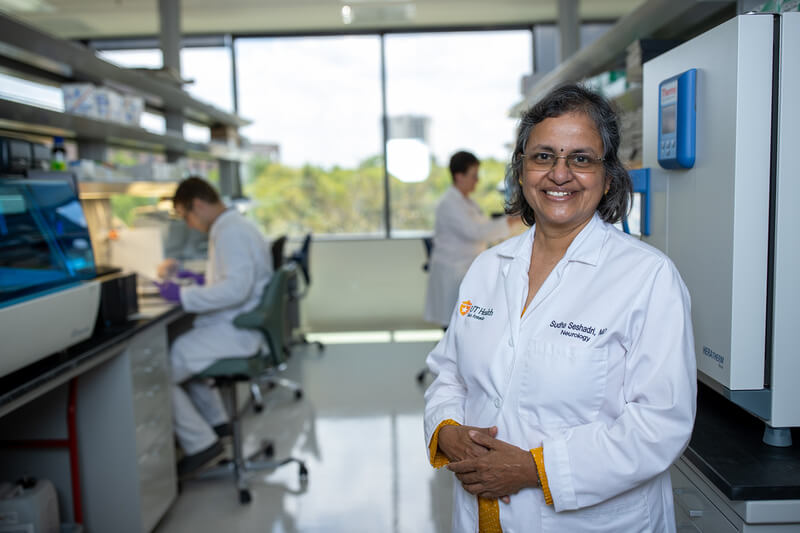Sudha Seshadri, MD, was just 4 years old when her mother developed a neurological disease. It eventually led to her death when Sudha was just 18. Sudha’s father died just two months later.
The experience shaped her interest in the impact of brain disease on communication, walking and behavior.
She competed undergraduate studies at Christian Medical College at the University of Madras, then was accepted into one of India’s top schools, the All India Institute of Medical Sciences in New Delhi, where she earned a medical degree in internal medicine and a doctorate in neurobiology. There she met her husband, S. Vasan Ramachandran, a cardiologist who later joined the Massachusetts-based Framingham Heart Study, which was to become an integral project in Dr. Seshadri’s own career. The Framingham Heart Study is a research initiative that has tracked thousands of people since 1948 to study heart disease and other medical conditions.
Dr. Seshadri did a neurology fellowship with well-known Harvard-trained neurologist David Drachman at the University of Massachusetts Medical Center at Worcester, Maryland. After completing it, she went back to India. When the opportunity arose for her husband to return to Framingham, the couple decided to move to the U.S.
Dr. Seshadri did more work for Framingham while also completing a fellowship in epidemiology. She joined the faculty of Boston University School of Medicine in 2005, then, in 2013, she became the neurology lead of the Framingham study.
That’s where she was when she was recruited to join UT Health San Antonio with an opportunity to integrate research with patient care. Studying dementia in South Texas Hispanics, she realized, was critical. And the opportunity to also treat patients, a passion of hers, was too good to pass up.
“If we find answers in a new and unique group of people, that is good for the country and will help all people,” she said.
She joined the university in 2017 as professor of neurology and the founding director of the Glenn Biggs Institute for Alzheimer’s and Neurodegenerative Diseases, where she continues to dedicate her life to transforming care and seeking cures for Alzheimer’s disease and other dementias. In September, the institute was named Texas’ only National Institute on Aging-designated Alzheimer’s Disease Research Center.
Dr. Seshadri is hopeful that in the next three to five years, there will be new treatments for Alzheimer’s and other dementias.
“I do not believe dementia is inevitable,” she said. “Just as we believe bone loss [as an example] can be prevented, brain failure can be prevented.”
Learn more about Dr. Seshadri and her passion for dementia care and prevention.


